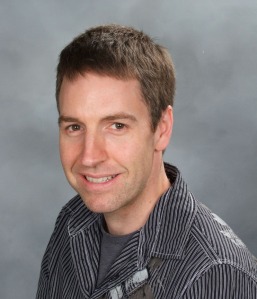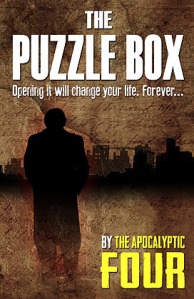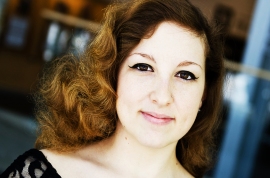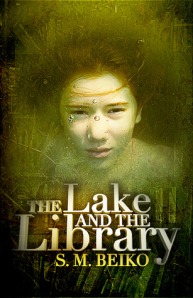I’m pleased to welcome Ryan McFadden as my author in the spotlight guest today!
Ryan T. McFadden is a two-time Aurora Award winner, the first for Women of the Apocalypse (Absolute Xpress – 2009) then for Bourbon and Eggnog (part of the 10th Circle Project). As well, he’s had numerous stories published in magazines and anthologies: Evolve 2- Tales of the Future Undead, Broken Time Blues, When the Villain Comes Home, Expiry Date (forthcoming), Blood & Water, Fight Night, Sinister Tales, and others.
He is one of the Apocalyptic Four (along with the current roster of Eileen Bell, Randy McCharles, and Billie Milholland), a collaboration that created The Puzzle Box (EDGE Science Fiction and Fantasy Publishing).
He was one of the creators and editors of the 10th Circle Project, an award winning collaborative writing project based on the mysterious twin cities of Hope and Glory.
When he’s not writing, he is busy tearing down houses (and rebuilding them) with his home renovation company Revival Renovations.
***
SEVEN SPOTLIGHT QUESTIONS:
#1: Why do you write?
Because. It’s my way of expressing myself obviously, but without writing, I start to go a bit squirrely. Writing is something that I feel I need to do—I’ve somehow tied my whole identity and ego into it. Writing is me. As life has become hectic, sometime I’m not as disciplined as I need to be, but I always come back – because I don’t have a choice.
#2: What was your earliest writing experience?
The earliest I remember was sometime around grade 2. I couldn’t really write yet, so I started making picture books with a few words thrown onto the pages here and there. These picture books were about my favourite topics: space battles. I don’t remember much about it, but I do remember having lots of decapitations, amputations, and copious amounts of blood.
When I showed my mom, I still remember the look on her face – absolute horror. I was this quiet kid who somehow seemed to have an eye for violence. She said that all that violence was upsetting and that maybe I should write nice stories from now on. I mostly ignored that advice and instead only showed her the nice stories. The rest I kept between my mattress and box spring.
#3: Describe a day in your writing life:
I’m not very focused. My usual writing day is checking email. Then checking bank accounts. Then surfing the web reading about the history of the baby seal hunt. The internet is my nemesis so I usually have to unplug. Completely. In the last couple of years, I’ve taken to hand writing all of my work. I like to go to a library and write—anywhere I won’t have interruptions but will still have that pleasant white noise.
#4: What authors influenced you and how?
It was the fantasy writers that began my journey: Lloyd Alexander, then C.S. Lewis and Tolkien. I wanted to follow in their footsteps—to create the worlds of the fantastic.
When I was in my teens, it was Robert McCammon – his stories always had a sense of wonder to them, perhaps a little more fantastic than Stephen King. Clive Barker’s Books of Blood were hugely influential as they stretched the limits of what could be done in the horror field.
Robert J. Sawyer really pulled back the veil from the publishing world. There’s a reason so many people thank him at award ceremonies and dedicate books to him—he shares his wealth of knowledge of how to succeed.
#5: What are some things you learned to help with your success?
Writing has to be for the writer, first and foremost. If I’m not writing the story for me, then ultimately, the story will collapse. While you can keep an eye on the markets, write what is important to you.
#6: Describe your writing method:
I try to develop THE IDEA. That single nugget that makes someone go ‘huh’. From there, I start trying to develop a very loose plot. Then the characters because they’ll ultimately shape the plot. I like to extensively outline, even going so far as to write entire passages of dialogue. Most times, however, my outlines and the finished project are only distant cousins. Often when transforming an outline into a written work, flaws, logic gaps, and other inconsistencies become apparent. Each hiccough causes me to go back to the outline level.
#7: Tips for aspiring writers:
Aside from all the ‘writers write’ stuff, I’d say that you have to start with short works. I still find short fiction difficult, but focusing on the shorter works will really help the novel. Robert J. Sawyer said to me: A lawyer doesn’t try murder cases directly from law school, so you can’t expect the novel to be your first sale. Focusing on the short fiction has helped all aspects of my craft—I can’t stress enough how important it was to my development.
Bonus second tip: quit waiting for the perfect time. Follow Nike: Just Do It! (Why, this could apply to everything in your life).
***
The Puzzle Box, by Apocalyptic Four (AKA Eileen Bell, Billie Milholland, Randy McCharles and Ryan McFadden) is an urban fantasy novel published by EDGE Science Fiction and Fantasy Publishing.
***
Archeology Professor Albert Mallory understands reality. He knows the way the world works. When he steals an ancient puzzle box to pay off gambling debts, he thinks the only mysterious thing about the artifact is how to get it open. But when a stranger appears at Albert’s door demanding to see the box, Albert is plunged into mysteries he never dreamt possible. Through the tales of four others who succeeded in opening the puzzle box — a musician named Warlock with a weakness for witches; photographer Autumn Bailey, with a strange link to the past; video store clerk Angela Matterly with those unworldly eyes; and a comic book illustrator called Sam, on a quest for his life — Albert learns that reality is transient and the way the world works is not found in text books.
***
Connect with Ryan:
Webpage: http://www.ryanmcfadden.com
Twitter: @ryantmcfadden
Facebook: http://www.facebook.com/ryan.mcfadden1
Fan email address: r@ryanmcfadden.com
***




